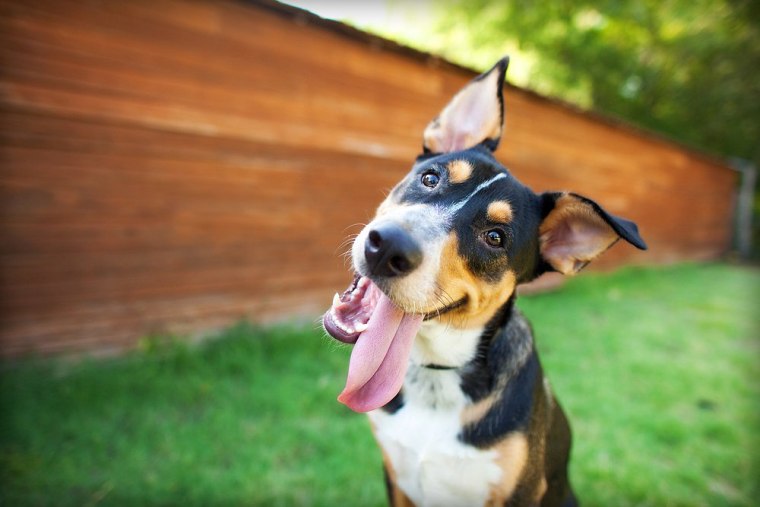Beyoncé and Jay-Z have tried it. Benedict Cumberbatch is committed to it. Alicia Silverstone showed it's far from a "Clueless" way to live. But for even the most environmentally conscious and those concerned about the cruelty of the meat, dairy and egg industries, there seems to be an open question: Can (or should) your dogs be vegan?
Veterinary science provides some interesting answers. As Cailin R. Heinze, a board-certified veterinary nutritionist at the Cummings School of Veterinary Medicine at Tufts University, points out, dogs are actually fully capable of extracting the nutrients they need from plant-based sources. Dogs, in fact, are more accurately categorized as omnivores than carnivores — unlike, say, cats (sorry, vegetarian cat people).
Though skeptics of the idea of feeding dogs plant-based diets often point to wolves — a close relative of domesticated dogs and infamous carnivores — as evidence that it would be unhealthy or even dangerous, Heinze clarifies that one of the distinguishing factors between dogs and wolves is that dogs are much more capable of digesting starches (i.e., plant matter).
Now, none of this clarifies whether a plant-based diet or meat-heavy diet is necessarily the optimal one for Fido. And Heinze does note that virtually all home-cooked dog meals, vegan or not, are lacking in nutrients, and that not all plant-based dog foods on the market are made equally. She urges pet parents to work with a veterinary nutritionist to design a balanced diet if they are serious about raising vegan pups, but volunteers that most dogs can thrive on a vegan diet as long as it’s one that’s been carefully designed.
So at the least, a theoretical understanding of canine digestive systems and various published studies have provided evidence that dogs can do just as well on a balanced vegan diet as a meaty diet (at least in the limited scopes and periods of time they’ve been observed). And, as more research and innovation is done on pet nutritional solutions, it wouldn’t be surprising to see more vet-approved plant-based pet foods on the market.
There are already some commercially available. Pet treat manufacturer Wild Earth, for instance, uses the fungus koji as a core ingredient, chosen in part because it’s comprised of a greater percentage of protein than even a steak. Since 2005, V-dog has seen thousands of dogs thrive on their complete & balanced formula made from whole foods like peas, lentils, quinoa and brown rice. Halo's Garden of Vegan dog food are made with chickpeas, vegetables and fruits, and oils.
But there’s a big gap between having your pets go fully vegan and simply replacing their meat-based treats with plant-based ones. Still, even if fully vegan diets for dogs don’t yet have the veterinary community’s universal approval, making modest changes in your dog’s diet is hardly likely to put him at risk — especially if the new foods are made of high-quality proteins like lentils and chickpeas and minimal-to-no fillers, like ground yellow corn and corn gluten meal.
Plus, the reasons for everyone to cut back on animal products are stacking up.
The threat that animal agriculture poses to the environment, what with its use of land and water resources and production of greenhouse gases, includes biodiversity loss, extreme weather events, decreased air quality, and waste lagoons.
The situation isn't any different when it comes to the resources required to produce meat for pet food and, additionally, pet food in particular tends to require high-temperature (and thus high-energy) processing. It’s not yet clear if or which plant-based pet foods make the most eco-friendly alternative, but the impending threat of climate change makes it worth looking into — especially considering that in the U.S., dogs and cats eat as much as one-fifth of the human population.
The environmental impact of feeding your dogs meat, however, is beside the fairly obvious point that it necessitates the systematized killing and suffering of other animals. As people who claim to be animal lovers, this should be troubling. We may have close bonds with our own pets, but it’s worth asking ourselves if our love for our pups renders the suffering of anonymous cows and chickens totally insignificant.
So, even if you (and your vet) aren’t ready to make your companion animals vegan, cutting back on meat in your dog’s diet is unlikely to pose a risk to her health (and may even be good for her), and assuredly will have a positive impact on the well being of other animals and the planet. Plus, in a market-driven economy, any money you spend on a more sustainable diet for your pets is a great incentive for scientists and food developers to continue experimenting with healthy, sustainable and cruelty-free pet food options.



